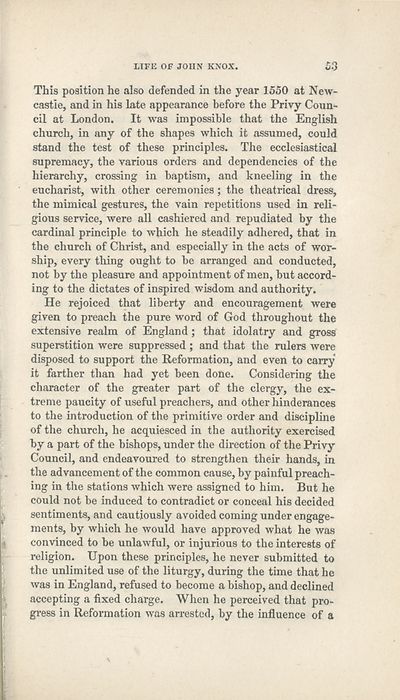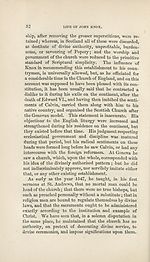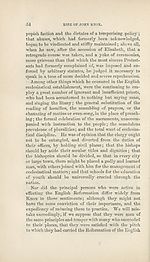Download files
Complete book:
Individual page:
Thumbnail gallery: Grid view | List view

LIFE OF JOHN KNOX.
This position he also defended in the year 1550 at New¬
castle, and in his late appearance before the Privy Coun¬
cil at London. It was impossible that the English
church, in any of the shapes which it assumed, could
stand the test of these principles. The ecclesiastical
supremacy, the various orders and dependencies of the
hierarchy, crossing in baptism, and kneeling in the
eucharist, with other ceremonies; the theatrical dress,
the mimical gestures, the vain repetitions used in reli¬
gious service, were all cashiered and repudiated by the
cardinal principle to which he steadily adhered, that in
the church of Christ, and especially in the acts of wor¬
ship, every thing ought to be arranged and conducted,
not by the pleasure and appointment of men, but accord¬
ing to the dictates of inspired wisdom and authority.
He rejoiced that liberty and encouragement were
given to preach the pure word of God throughout the
extensive realm of England; that idolatry and gross
superstition were suppressed ; and that the rulers were
disposed to support the Reformation, and even to carry
it farther than had yet been done. Considering the
character of the greater part of the clergy, the ex¬
treme paucity of useful preachers, and other hinderances
to the introduction of the primitive order and discipline
of the church, he acquiesced in the authority exercised
by a part of the bishops, under the direction of the Privy
Council, and endeavoured to strengthen their hands, in
the advancement of the common cause, hy painful preach¬
ing in the stations which were assigned to him. But he
could not be induced to contradict or conceal his decided
sentiments, and cautiously avoided coming under engage¬
ments, by which he would have approved what he was
convinced to be unlawful, or injurious to the interests of
religion. Upon these principles, he never submitted to
the unlimited use of the liturgy, during the time that he
was in England, refused to become a bishop, and declined
accepting a fixed charge. When he perceived that pro¬
gress in Reformation was arrested, by the influence of a
This position he also defended in the year 1550 at New¬
castle, and in his late appearance before the Privy Coun¬
cil at London. It was impossible that the English
church, in any of the shapes which it assumed, could
stand the test of these principles. The ecclesiastical
supremacy, the various orders and dependencies of the
hierarchy, crossing in baptism, and kneeling in the
eucharist, with other ceremonies; the theatrical dress,
the mimical gestures, the vain repetitions used in reli¬
gious service, were all cashiered and repudiated by the
cardinal principle to which he steadily adhered, that in
the church of Christ, and especially in the acts of wor¬
ship, every thing ought to be arranged and conducted,
not by the pleasure and appointment of men, but accord¬
ing to the dictates of inspired wisdom and authority.
He rejoiced that liberty and encouragement were
given to preach the pure word of God throughout the
extensive realm of England; that idolatry and gross
superstition were suppressed ; and that the rulers were
disposed to support the Reformation, and even to carry
it farther than had yet been done. Considering the
character of the greater part of the clergy, the ex¬
treme paucity of useful preachers, and other hinderances
to the introduction of the primitive order and discipline
of the church, he acquiesced in the authority exercised
by a part of the bishops, under the direction of the Privy
Council, and endeavoured to strengthen their hands, in
the advancement of the common cause, hy painful preach¬
ing in the stations which were assigned to him. But he
could not be induced to contradict or conceal his decided
sentiments, and cautiously avoided coming under engage¬
ments, by which he would have approved what he was
convinced to be unlawful, or injurious to the interests of
religion. Upon these principles, he never submitted to
the unlimited use of the liturgy, during the time that he
was in England, refused to become a bishop, and declined
accepting a fixed charge. When he perceived that pro¬
gress in Reformation was arrested, by the influence of a
Set display mode to:
![]() Universal Viewer |
Universal Viewer | ![]() Mirador |
Large image | Transcription
Mirador |
Large image | Transcription
| Antiquarian books of Scotland > Scotland/Scots > Life of John Knox ; and, The life of Alexander Henderson > (71) |
|---|
| Permanent URL | https://digital.nls.uk/131833156 |
|---|
| Description | Thousands of printed books from the Antiquarian Books of Scotland collection which dates from 1641 to the 1980s. The collection consists of 14,800 books which were published in Scotland or have a Scottish connection, e.g. through the author, printer or owner. Subjects covered include sport, education, diseases, adventure, occupations, Jacobites, politics and religion. Among the 29 languages represented are English, Gaelic, Italian, French, Russian and Swedish. |
|---|

